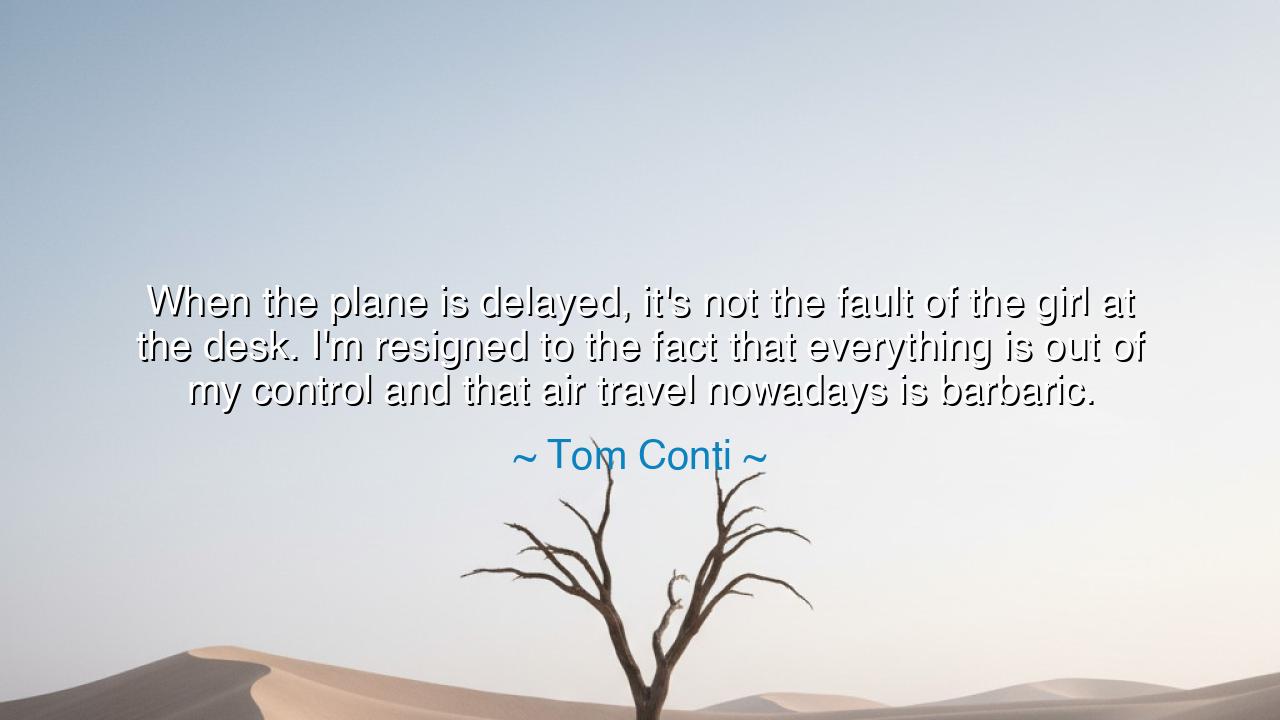
When the plane is delayed, it's not the fault of the girl at the
When the plane is delayed, it's not the fault of the girl at the desk. I'm resigned to the fact that everything is out of my control and that air travel nowadays is barbaric.






"When the plane is delayed, it's not the fault of the girl at the desk. I'm resigned to the fact that everything is out of my control and that air travel nowadays is barbaric." Thus speaks Tom Conti, and though he speaks of airports and flights, his words carry wisdom that reaches far beyond the gates of travel. In them is the ancient truth of patience, of acceptance, of recognizing the boundaries of our own power. For man, no matter how mighty, must face times when he cannot command the winds, when he cannot bend the iron of circumstance to his will.
The ancients would have nodded with solemn agreement. Did not Marcus Aurelius write that peace is found when we distinguish between what is in our control and what is not? The plane delay is but a modern echo of storms at sea, of armies delayed by rain, of merchants stranded by broken roads. The wise man does not rage against what he cannot change, nor does he cast blame on the innocent who stand nearest to his frustration. Instead, he disciplines the spirit, remembering that wrath accomplishes nothing but the wounding of others.
Consider the story of Admiral Horatio Nelson, caught in a calm on the wide ocean. His fleet could not move, no matter the urgency of war. His sailors grumbled, his officers despaired, but Nelson, understanding the limits of his power, chose not to rage against the sea. Instead, he prepared his men, repaired his ships, and readied for the moment the winds would return. His acceptance was not weakness, but wisdom. Likewise, Conti’s words remind us that shouting at the girl at the desk will not summon the skies to obedience.
There is also a cry in his statement—that air travel is barbaric. He reveals the disillusionment of modern life: though we fly through the heavens like gods, we often do so with indignity, discomfort, and frustration. Progress has given us wings, but not always grace. The lesson here is clear: outward advancement does not always bring inward refinement. Civilization may stride across continents in hours, yet still stumble in courtesy, patience, and peace of mind.
Children of tomorrow, learn this: there will always be delays in the journey. You may plan with precision, but fate laughs at timetables. Do not waste your spirit on rage, for it will not quicken the hour. Instead, guard your soul. Accept what you cannot command, and use the waiting as a teacher. In patience, you discover strength. In acceptance, you find serenity. In mercy toward the innocent, you show greatness of heart.
Practical action lies before you. When anger rises against those who cannot help, pause. Breathe. Remember that they, too, are caught in the web of circumstance. Instead of bitterness, show kindness. Instead of rage, show restraint. Carry a book, carry silence, carry calm—so that when delays come, you turn them into hours of growth rather than wounds of temper. In this way, you transform frustration into wisdom, and barbarism into dignity.
Thus the lesson is plain: the world is filled with forces you cannot master. Do not waste your fire upon them. Save it for the tasks where your hand can shape destiny. Accept the barbarism of travel, accept the delays of life, but do so with grace. For in the end, the true journey is not from one city to another, but from wrath to patience, from frustration to peace. And that journey lies always within your control.






AAdministratorAdministrator
Welcome, honored guests. Please leave a comment, we will respond soon